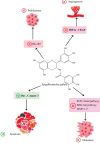Epigallocatechin-3-gallate and its nanoformulation in cervical cancer therapy: the role of genes, MicroRNA and DNA methylation patterns
- PMID: 38129839
- PMCID: PMC10740301
- DOI: 10.1186/s12935-023-03161-9
Epigallocatechin-3-gallate and its nanoformulation in cervical cancer therapy: the role of genes, MicroRNA and DNA methylation patterns
Abstract
Green tea, a popular and healthy nonalcoholic drink consumed globally, is abundant in natural polyphenols. One of these polyphenols is epigallocatechin-3-gallate (EGCG), which offers a range of health benefits, such as metabolic regulation, antioxidant properties, anti-inflammatory effects, and potential anticancer properties. Clinical research has shown that EGCG can inhibit cancers in the male and female reproductive systems, including ovarian, cervical, endometrial, breast, testicular, and prostate cancers. Further research on cervical cancer has revealed the crucial role of epigenetic mechanisms in the initiation and progression of this type of cancer. These include changes to the DNA, histones, and non-coding RNAs, such as microRNAs. These changes are reversible and can occur even before genetic mutations, making them a potential target for intervention therapies. One promising approach to cancer prevention and treatment is the use of specific agents (known as epi-drugs) that target the cancer epigenome or epigenetic dysregulation. Phytochemicals, a group of diverse molecules, have shown potential in modulating cancer processes through their interaction with the epigenetic machinery. Among these, green tea and its main polyphenol EGCG have been extensively studied. This review highlights the therapeutic effects of EGCG and its nanoformulations on cervical cancer. It also discusses the epigenetic events involved in cervical cancer, such as DNA methylation and microRNA dysregulation, which may be affected by EGCG.
Keywords: Cervical cancer; DNA methylation; Epigallocatechin-3-gallate; Green tea; MicroRNA; Nanotechnology.
© 2023. The Author(s).
Conflict of interest statement
The authors declare no competing interests.
Figures
Similar articles
-
Updated review on green tea polyphenol epigallocatechin-3-gallate as a cancer epigenetic regulator.Semin Cancer Biol. 2022 Aug;83:335-352. doi: 10.1016/j.semcancer.2020.11.018. Epub 2021 Jan 13. Semin Cancer Biol. 2022. PMID: 33453404 Review.
-
Green Tea Epigallocatechin-3-Gallate Regulates Autophagy in Male and Female Reproductive Cancer.Front Pharmacol. 2022 Jul 4;13:906746. doi: 10.3389/fphar.2022.906746. eCollection 2022. Front Pharmacol. 2022. PMID: 35860020 Free PMC article. Review.
-
New insights into the mechanisms of polyphenols beyond antioxidant properties; lessons from the green tea polyphenol, epigallocatechin 3-gallate.Redox Biol. 2014 Jan 10;2:187-95. doi: 10.1016/j.redox.2013.12.022. eCollection 2014. Redox Biol. 2014. PMID: 24494192 Free PMC article. Review.
-
Pharmacokinetics and safety of green tea polyphenols after multiple-dose administration of epigallocatechin gallate and polyphenon E in healthy individuals.Clin Cancer Res. 2003 Aug 15;9(9):3312-9. Clin Cancer Res. 2003. PMID: 12960117 Clinical Trial.
-
Green Tea in Reproductive Cancers: Could Treatment Be as Simple?Cancers (Basel). 2023 Jan 30;15(3):862. doi: 10.3390/cancers15030862. Cancers (Basel). 2023. PMID: 36765820 Free PMC article. Review.
Cited by
-
Bioinformatics Analysis and Experimental Validation of Epigallocatechin-3-gallate Against Iopromide-induced Injury in HEK-293 Cells via Anti-oxidative and Anti-inflammation Pathways.In Vivo. 2024 Nov-Dec;38(6):2617-2628. doi: 10.21873/invivo.13738. In Vivo. 2024. PMID: 39477405 Free PMC article.
-
Ocoxin Oral Solution Triggers DNA Damage and Cell Death in Ovarian Cancer.Nutrients. 2024 Jul 25;16(15):2416. doi: 10.3390/nu16152416. Nutrients. 2024. PMID: 39125297 Free PMC article.
-
Polyphenol-based polymer nanoparticles for inhibiting amyloid protein aggregation: recent advances and perspectives.Front Nutr. 2024 Jul 29;11:1408620. doi: 10.3389/fnut.2024.1408620. eCollection 2024. Front Nutr. 2024. PMID: 39135555 Free PMC article. Review.
References
-
- Siegel RL, Miller KD, Jemal A, Cancer statistics. 2016. CA: a cancer journal for clinicians. 2016;66(1):7–30. - PubMed
Publication types
LinkOut - more resources
Full Text Sources


